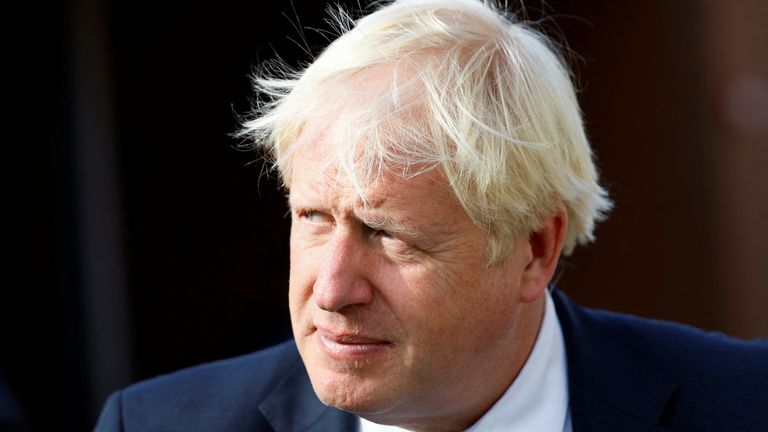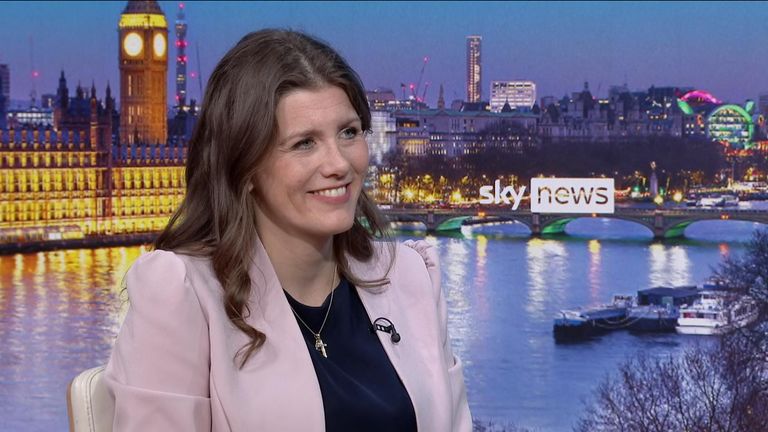Adam Boulton: No one likes a turncoat, but Labour is gambling Tory MP’s defection shows which way political wind is blowing

The Labour Party is in shock over the leadership’s decision to welcome the defection of the right-wing former Conservative MP Natalie Elphicke.
The day before she literally “crossed the floor” before Prime Minister’s Questions to sit on the opposition benches, Elphicke distributed a leaflet in her Dover constituency attacking Sir Keir Starmer.
On Wednesday, as MPs looked on aghast on both sides, he reached back from the front bench to shake her hand, and later posed for smiling photographs with her.
Elphicke is the second Tory MP in a fortnight to switch to Labour. Both she and Dr Dan Poulter have said that they will stand down at the general election and will not fight for re-election in their old constituencies or, at the time of writing, in another seat.
Labour insists that neither of them has been promised elevation to the House of Lords in an upcoming honours list.
Lee Anderson, another recent defector who shifted rightward from the Conservatives, is currently an independent but has suggested that he intends to stand for Reform UK in his Ashfield, Nottinghamshire, constituency.
The saying goes that “nobody likes a turncoat”. That has never stopped some MPs switching their party allegiances.
Whatever party activists and the voters make of the changes, the switchers take a risk with their own careers. Their political fortunes after the change often sink.
Since 1979, when Margaret Thatcher came to power, a total of 202 sitting members of parliament have changed their party allegiance.
More than half of these resigned the party whip or had it withdrawn because of personal grievances or disciplinary procedures.
The real number of those who may be classed as genuine “defectors”, active campaigners intent on making an awkward political point, is much smaller.
👉 Listen above then tap here to follow Electoral Dysfunction wherever you get your podcasts 👈
In this parliament, a remarkable total of 39 MPs have changed allegiance. Twenty-four had the whip taken away from them, six have been suspended and nine resigned.
Of these only half a dozen are classic defectors. They are Elphicke, Poulter and Anderson plus Kenny MacAskill and Neale Hanvey who crossed the floor from the SNP to Alba, and Christian Wakeford.
Wakeford was the first switcher from the Conservatives to Labour in January 2022, disgusted by partygate.
He has been selected to stand for Labour in his marginal constituency of Bury South. All the indications are that he has a better chance of re-election there this year than under his old blue banner.
Not many defectors go on to enjoy prominent political careers after making the move.
In the late 1970s and early 1980s, ideological civil war raged in the Labour Party.
Twenty-eight Labour MPs (and one Conservative) switched to join Roy Jenkins and Shirley Williams in the newly formed, centrist, Social Democratic Party.
Only half a dozen of them made it back into parliament at the 1983 General Election.
The SDP split five years later when party leaders Robert Maclennan and Charles Kennedy were technically defectors again, moving to merge with the Liberals in the new Liberal Democrat Party.
Kennedy was scarred by years of vicious harassment by those who chose to remain with David Owen in the rump SDP, which, in turn, disbanded in 1990 after being overtaken by the Monster Raving Loony Party in the Bootle by-election.
In 2017, centrists were involved in another upheaval in the wake of the EU membership referendum.
Eight Labour MPs and three Conservatives, who all opposed Brexit, resigned their whips. The newly formed Change Party did not prosper.
None of those involved are currently MPs or members of the House of Lords. Two Labour MPs, John Woodcock and Ian Austin, who jumped ship in protest at Jeremy Corbyn’s leadership, were subsequently awarded peerages by the Tories.
Elphicke is one of the relatively few female defectors. Two women who left their parties have now circled back to them after dalliances with the Lib Dems.
Emma Nicholson has rejoined the Conservatives and Luciana Berger is campaigning for Sir Keir Starmer.
Read more:
What happens when an MP defects to another party?
Lord Cameron accuses Labour of standing for nothing after taking in Tory MP Natalie Elphicke
Very few turncoats make it back into ministerial office.
Reg Prentice was a Labour cabinet minister in the 1970s, as both education and overseas development secretary. But Trotskyist members of the Militant Tendency forced his deselection as Labour candidate in Newham North East.
He was elected as a Conservative in Daventry in the 1979 election and served under Margaret Thatcher as a health minister.
Until this parliament the last time when an MP crossed the floor from one main party to the other was three decades ago in the run-up to Tony Blair’s landslide election victory in 1997.
Defections then, from the Conservatives to Labour, are reminiscent of the moves going on now in anticipation of a Tory defeat.
Alan Howarth and Shaun Woodward, two Tory MPs who flipped straight to Labour, were selected to stand in other safe Labour seats in 1997 and went on to become ministers.
Howarth had previously been a minister in the Conservative government. Woodward had been the Conservative party’s director of communications.
Nicholson, Prentice, and Howarth ended up in the House of Lords along with Peter Temple-Morris, who resigned the Conservative whip in sympathy with New Labour and Hugh Dykes who switched to the Liberal Democrats.
Woodward and Peter Thurnham, another Conservative resigner, remain un-ennobled.
There have been two other significant groups of rebels in recent Conservative history, who were suspended or kicked out of the party.
In 1994, a dozen hardcore Eurosceptics, known as Whipless Wonders to their friends or “bastards” waiting for “the men in white coats” to prime minister John Major, had the whip removed for voting against part of Kenneth Clarke’s budget.
The whip was restored a few months later. These temporarily enforced defectors failed to bring down Major and most have since died.
They will be remembered however for lighting the fuse on the anti-EU bomb which subsequently blew the Tory party apart.
In his push to “get Brexit done” prime minister Boris Johnson brutally withdrew the whip from 21 leading Conservative MPs who were opposed his policy.
Those purged included Rory Stewart, Ken Clarke, David Gauke, Justine Greening, Dominic Grieve, Nicholas Soames and Philip Hammond.
Amber Rudd resigned in protest. The whip was offered back to some of them but only a handful stood for the Commons in 2019. Only two, Greg Hands and Caroline Nokes, plan to run in the next general election. Nicholas Soames, Ed Vaizey and Ken Clarke were awarded peerages.
New defectors are usually rubbished by the party which they are leaving and praised by members of the one they are joining.
That has not been Natalie Elphicke’s experience. Tories are mocking Labour for adopting a right-winger out of sympathy with Labour values.
Labour MPs are professing bewilderment and annoyance. Some female Labour MPs are further outraged that she attempted to excuse her husband, and predecessor as Dover MP, “naughty Tory” Charlie Elphicke, who was imprisoned for sexual assault. The couple subsequently divorced.
Sir Keir Starmer says he is “delighted” to sign her on. He wants former Tory voters to know that his Labour party is a safe harbour for them, especially those most concerned, like Elphicke, by immigration.
She also has an established interest in housing and will be a consultant to Labour on that, we are told.
Most importantly in her resignation letter 43-year-old Elphicke berated Rishi Sunak as “unelected” and the Conservative party of government as “a byword for incompetence and division”.
Labour is gambling that her move to their party will confirm to all who care which way the political wind is blowing – as many defectors have done in the past.
Related
Best Crypto Casinos UK – Top 10 Bitcoin Gambling Sites…
Despite its overwhelming popularity, crypto gambling in the UK remains in a legal gray area. All casino operators in the UK need to have a valid permit, as requ
Online gambling channelisation in the UK – How well it…
Gambling in the UK is controlled under the Gambling Act 2005. This act requires all gambling operators to be licensed and regulated by the UK Gambling Commis
UK Gambling Commission Opens White Paper Public Feedback | Suffolk…
The UK Gambling Commission (UKGC) has initiated its third consultation period to gain feedback and proposals to make gambling machines in the UK more secure a
Paddy Power High Court case: Gardener wins £1m payout
Mrs Durber sued PPB Entertainment Limited, which trades as Paddy Power and Betfair, for breach of contract and for the rest of her winnings, based on what she w
















